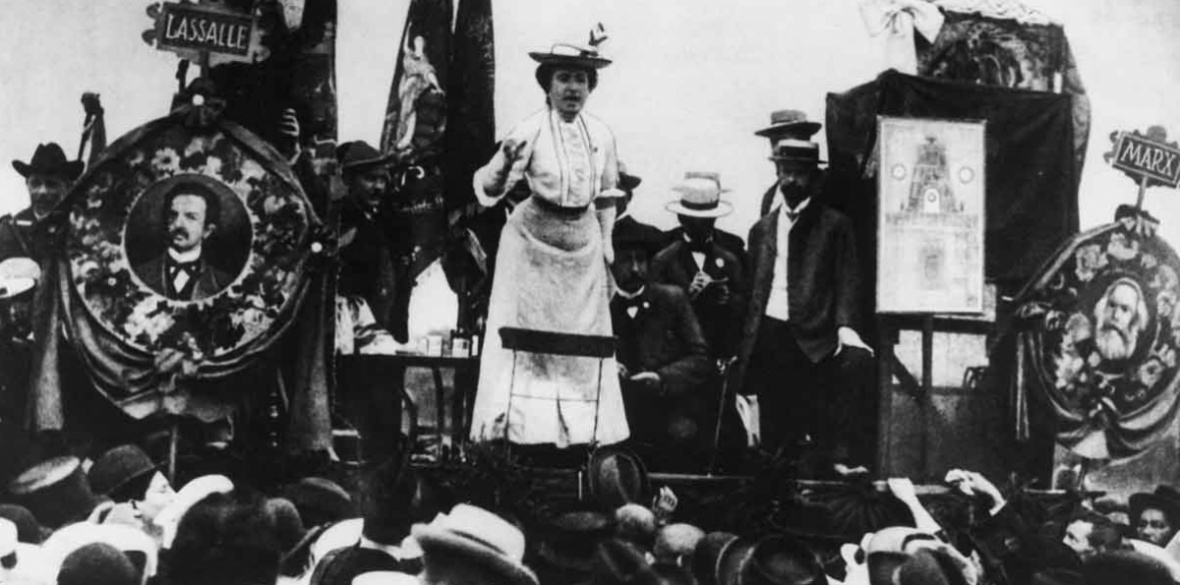This is the last article you can read this month
You can read more article this month
You can read more articles this month
Sorry your limit is up for this month
Reset on:
Please help support the Morning Star by subscribing here
AS we celebrate International Women’s Day we must remember the radical roots of March 8.
In so doing, we turn to the comrades who have given us social democracy as well as International Women’s Day, theorists and activists Rosa Luxemburg and Clara Zetkin.
Bound by a long friendship and in mutual struggle against oppression and fascism, their exchanges and their respective calls to action share that they were not satisfied with reforms.
They advocated a revolution of the unjust world, characterised by oppression, war and the evils of capitalism.
But let us turn to their own thought and action which still echo so much today.
Luxemburg (1871- 1919) was a groundbreaking Polish-Jewish Marxist writer and activist.
She has left us a rich legacy to consider in 2018. She was always focused firmly on the future, in a world in which oppression and exploitation would no longer be.
Luxemburg was internationalist through and through. She understood the only way to transcend multiple systems of oppression is through organised action, writing: “The whole development, the whole tendency of imperialism in the last decade leads the international working class to see more clearly and more tangibly that only the personal stepping forward of the broadest masses, their personal political action, mass demonstrations and mass strikes that sooner or later open into a period of revolutionary action in the state can give the correct answer to the proletariat to the immense pressure of imperialistic policy.”
Luxemburg understood very well that our challenges are international — hence they can only be brought down internationally.
She wrote economic as well as political theory; her work was rich and multifaceted. One of her most influential works was The Mass Strike, the Political Party and Trade Unions (1906).
Further, she writes: “The mass strike is the first natural, impulsive form of every great revolutionary struggle of the proletariat and the more highly developed the antagonism is between capital and labour, the more effective and decisive must mass strikes become.”
The mass strike is the voice of the masse. The strike is pragmatic work to bring down capitalist patriarchy.
Later in her life she developed this notion further, saying: “The masses must make themselves heard in order to propel the party ship forward. Then we will be able to face the future confidently. History will do its work. See that you too do your work.” (1913).
Luxemburg’s understanding of the mass strike underpins the women’s strike. It is exactly because it is impossible, that it is necessary. We will stop doing our work as a way to let history do its work and collapse patriarchal capitalism.
It was Luxemburg’s friend and comrade, the German Clara Zetkin (1857-1933), a passionate speaker, organiser for women’s rights and activist against capitalist exploitation and fascism, who brought a proposal to the Second International Conference of Working Women in 1910 to declare a day as the International Working Women’s Day, which became March 8 a few years later.
The day needs to be “according to socialist precepts,” she stressed, and it “must have an international character.”
While addressing the contemporary issue of women suffrage, Zetkin’s call was also a response to demonstrations and a 13-week strike of garment workers in New York City in the previous year.
The 1911 International Women’s Day was a big success and thus became enshrined in socialist-feminist history.
Zetkin’s feminism was always revolutionary. In a speech at the Congress of the Social Democratic Party in 1896, she emphasised that the bourgeois woman and the working-class woman have separate concerns in their liberation struggle.
The bourgeois woman demanded better educational opportunities and broader access to areas of work, while her working-class compatriot needed to fight “hand in hand with the man of her class against capitalist society.”
Zetkin adds that the working-class woman “agrees with the demands of the bourgeois women’s movement, but she regards the fulfilment of those demands simply as a means to enable that movement to enter the battle, equipped with the same weapons, alongside the proletariat.”
Much of this resonates with our present moment, namely at a time when the mainstream parties foster a neoliberal kind of feminism — corporate, elitist and individualistic.
In the International Women’s Strike (IWS), however, we find Luxemburg’s and Zetkin’s radical spirit returning to us. After all, the global grassroots movement is fighting for an anti-racist, anti-capitalist, anti-imperialist, all-inclusive feminism for the 99 per cent.
On March 8 last year, thousands of women rallied and marched in the largest cities, inspired by — and in solidarity with — strikes in Poland and Argentina.
This year’s International Women’s Day is marked again by worldwide mobilisation against gendered violence and the system that enables it.
Comrades Zetkin and Luxemburg have left us a calling and an urgency to not lose sight of our historical moment as we march on.
Doreen Densky is an activist and academic based in New York. Dana Mills is an activist and academic based in Oxford. They met through internationalist organising and this is a product of a longstanding collaboration and dialogue.










